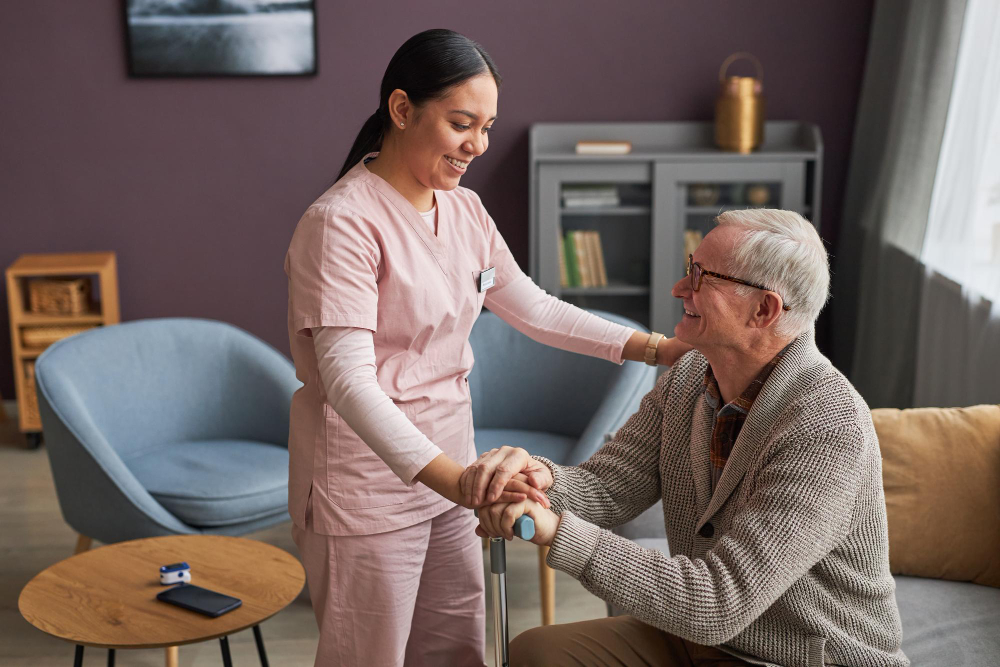
As our loved ones age, they often need additional support to maintain their quality of life. Professional caregiving services are invaluable, but family members must also be equipped to provide effective care. Understanding the basics of caregiving is crucial for ensuring the well-being of seniors, particularly when professional caregivers are unavailable.
Maintain a consistent daily routine
A structured daily routine is vital for senior well-being, offering a sense of security and improving both physical and mental health. For those with chronic conditions such as diabetes, dementia, or Parkinson's disease, routines can be especially beneficial.
Morning Walks and Exercise
Start the day with a morning walk to boost physical health and mental clarity. Regular walks stimulate motor skills, improve cardiovascular health, and enhance overall mobility. Light exercises like stretching or yoga are also beneficial.
Recognize subtle signs
Seniors often downplay their discomfort to avoid worrying family members. Being attentive to subtle signs of distress is essential.
Behavioral Changes
Watch for changes in behavior, appetite, sleep patterns, and mood. These can signal health issues. Maintaining a health journal can help track these changes and provide valuable information during medical consultations. Regular check-ups, ideally every six months, are crucial for monitoring health status and addressing issues early. Elder Care Service providers in Kolkata provide Doctor’s Assistance Services in the comfort of home to ensure senior loved ones feel comfortable and relaxed in familiar environment.
Encourage Open Communication and keep in touch
Open communication with seniors is essential for understanding their needs and concerns.
Regular Conversations
Discuss their health, needs, and any concerns they might have. This practice builds trust and helps identify issues early.
Quality Time
Spend quality time together through activities they enjoy, such as dining out, watching movies, or engaging in hobbies. Celebrating special occasions can enhance their happiness and sense of belonging.
Ensure a Safe and Comfortable Living Environment
Creating a secure and comfortable living space is fundamental in caregiving. Aging reduces physical capabilities, increasing the risk of accidents.
Eliminate Hazards
Remove tripping hazards like loose rugs and clutter. Ensure walkways are well-lit and clear.
Install Safety Devices
Equip the home with grab bars, handrails, and non-slip mats.
Accessibility
Arrange furniture and essential items within easy reach. Make sure frequently used items are easily accessible to reduce the risk of falls.
Comfort
Maintain a comfortable environment with optimal room temperature, comfortable seating, and easy access to amenities.
Encourage Healthy Eating Habits
A nutritious diet is crucial for senior health. Caregivers should ensure their loved ones consume balanced meals that meet their dietary needs.
Nutrient-Rich Diet
Include fruits, vegetables, whole grains, lean proteins, and dairy in their diet.
Hydration
Encourage regular water intake to prevent dehydration, which can cause serious health issues.
Special Dietary Needs
Consider any dietary restrictions due to health conditions. Consulting with a nutritionist for a tailored meal plan may be necessary.
Frequent, Small Meals
Seniors may benefit from smaller, frequent meals to maintain steady energy levels.
Support Mental and Emotional Health
Mental and emotional health is just as important as physical health for seniors. Aging can lead to loneliness, isolation, and depression.
Engaging Conversations
Regularly discuss their interests and encourage them to express their feelings.
Social Interaction
Arrange visits with family and friends and encourage participation in community activities.
Hobbies and Interests
Support their hobbies and interests, whether it's gardening, reading, or painting. These activities bring joy and fulfillment.
Mental Stimulation: Keep their minds active with puzzles, games, and other cognitive activities like Sudoku or crossword puzzles.
Provide Personal Care Assistance
Personal care, including help with activities of daily living (ADLs) such as bathing, dressing, and grooming, is crucial.
Respect Privacy
Maintain their dignity and privacy during personal care tasks.
Promote Independence
Encourage them to perform tasks independently when possible, offering support as needed.
Gentle Approach
Be patient and gentle, explaining each step to keep them informed and comfortable.
Be Prepared for Emergencies
Having an emergency plan is vital in caregiving.
Emergency Contacts
Keep a list of emergency contacts, including doctors and hospitals, easily accessible.
First Aid Kit
Maintain a well-stocked first aid kit and know how to use it.
Medical Information
Keep an updated record of their medical history, including medications and allergies.
Emergency Plan
Have an evacuation plan and procedures for different scenarios.
Seek Support When Needed
Caregiving can be demanding, and recognizing when to seek help is important.
Respite Care
Utilize respite care services to take breaks and prevent burnout, ensuring you can continue to provide effective care.
Caregiving for senior loved ones requires a comprehensive approach addressing physical, mental, and emotional needs. By following these essential tips, you can provide the care and support they need to live a healthy, happy, and comfortable life. Remember, your dedication makes a significant difference in their quality of life.